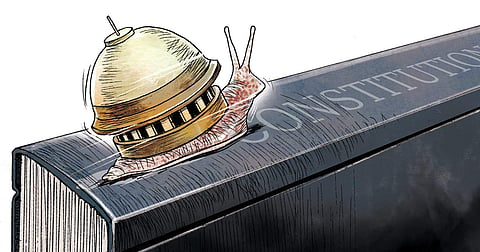

The UK Supreme Court pronounced its seismic judgment in R (Miller) v The Prime Minister on 24 September. The Court held that Prime Minister Boris Johnson’s advice to the Queen to prorogue Parliament for about five weeks was unlawful. Suspension of Parliament precisely meant an abrupt detachment from the European Union (EU) by the end of October without Parliament being able to chart out an exit plan, by formulating the terms or exercising other options.
Brexit involves enormous uncertainties for the citizens of the UK as well as other European countries. Johnson expected better advantages for Britain in negotiations with the European Union. Many in Parliament, however, wanted predictability and certainty regarding the conditions of Brexit, so as to make the process less miserable and more humane. The PM’s agenda was to invoke his ‘executive prerogative’ and to put a gag on Parliament. It suffered a judicial masterstroke. The protests in London endorsed the verdict in clear terms: “Don’t silence our MPs.”
Apart from its political connotations and implications on the public at large, the judgment is a triumph for constitutionalism across the world. The 11-judge Bench headed by Lady Hale said that the PM’s action is justiciable and the question relating to legality of the advice to the Queen is not a forbidden zone for the Court. It declared that sovereignty of Parliament, the first principle of the British Constitution, was diluted by invoking the prerogative power of prorogation.
The executive (read, the PM) cannot “prevent Parliament from exercising its legislative authority for as long as it pleased”. The Court gave equal emphasis to the second principle of the UK’s unwritten Constitution, namely, parliamentary accountability. It quoted Lord Bingham of Cornhill who laid down the legal position that “the conduct of Government by a Prime Minister and Cabinet collectively responsible and accountable to Parliament lies at the heart of Westminster democracy”. The court categorically held that “the Prime Minister’s action had the effect of frustrating or preventing the constitutional role of Parliament in holding the Government to account.”
The emblematic judgment has a few lessons to offer. The Indian Supreme Court in its landmark verdict in Kesavananda Bharati case (1973) held that Parliament cannot, by way of amendment, alter the basic structure of the Constitution. There is a general perception that R (Miller) v Prime Minister, in its own way, laid down the UK’s ‘Basic structure doctrine’ during a pernicious situation. The Indian judgment directed itself against executive and legislative excessiveness whereas the UK verdict tried to forestall the executive high-handedness and protect Parliament.
The Indian judgment antagonised the then Prime Minister Indira Gandhi who in turn, caused elevation of Justice A N Ray, who dissented from the majority view, as the Chief Justice of India. In the process, three senior judges—Justices J M Shelat, K S Hegde and A N Grover—who ruled against the government were superseded. For sure, the judges of the UK Supreme Court do not face any such executive threat pursuant to the present pronouncement.
Incidentally, the Kesavananda Bharati judgment ran into 703 pages whereas the UK judgment has just 24 pages. Brevity and clarity are judicial virtues of universal value. The simple verdict is intrinsically democratic as it was delivered so quickly, as necessitated by the circumstances. The arguments were heard on 17, 18 and 19 September 2019 and the judgment was delivered within a week. Even an unconventional situation in the UK could be resolved with thoroughly conventional constitutional tools. The timely verdict decided the gravest constitutional issue in that nation’s recent history. The failure of the Indian SC to act as the guardian of the Constitution during critical situations calls for an honest introspection.
The UK verdict, by implication, emphasised the value of debates in the legislature. A deliberative democracy needs to recognise the potential of Parliamentary debates, for it is the forum where people of the country talk to one another through their elected representatives. “The government solution to a problem is usually as bad as the problem,” said Milton Friedman, an American economist. There is greater democratic legitimacy for the decisions by Parliament than by the executive.
Ideally and arguably, Parliament is more equipped to follow Mark Twain’s advice: “Loyalty to the country—always; loyalty to the government—only when it deserves it.” This is, however, wishful thinking in the Indian context. A major part of productive time in both the Houses of Indian Parliament is notoriously wasted due to disruptions. We need to cultivate a responsible and pluralistic legislative morality.
There is nothing resembling a committed judiciary in the UK and that in itself is the foundational reason for the judgment that upheld that country’s constitutional legacy. It therefore follows that an opaque collegium centred judicial system in India needs structural reforms to gain functional results.